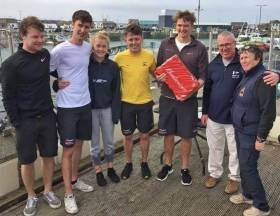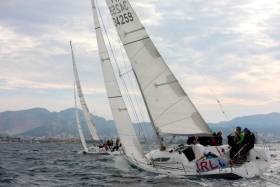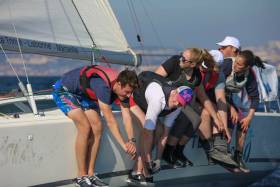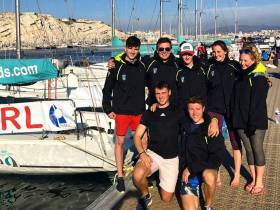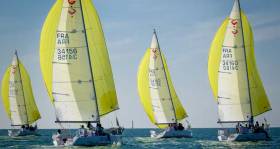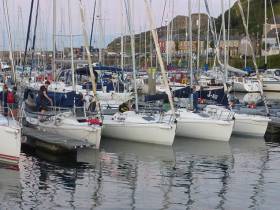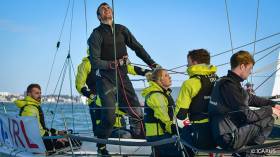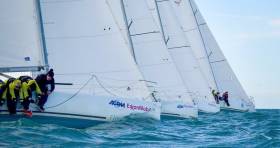Displaying items by tag: Student Yachting World Cup
Harry Durcan is March “Sailor of the Month”
It was Cork crews all the way in yesterday’s intensely-fought final in the two-day Student Nationals in the J/80s at Howth Yacht Club.
But in the end, victory was taken by Cork Institute of Technology helmed in style by Harry Durcan. The final margin over University College Cork may only have been one point, yet CIT is now not only Irish champions, but they will be the national team in the Student Yachting Worlds in France in the Autumn.
More on this story here.
UCD Finish Fifth Overall at Student Yachting World Cup
UCD Team Ireland finished fifth overall in the Student Yachting World Cup in France today. The Dublin team was disappointed that the last day of racing had to be cancelled due to lack of wind, but are very happy with their overall result.
The event in general provided spectators with some very exciting racing. While the Scottish team pulled ahead early in the competition, in the end it was Team Japan who won the SYWOC title.
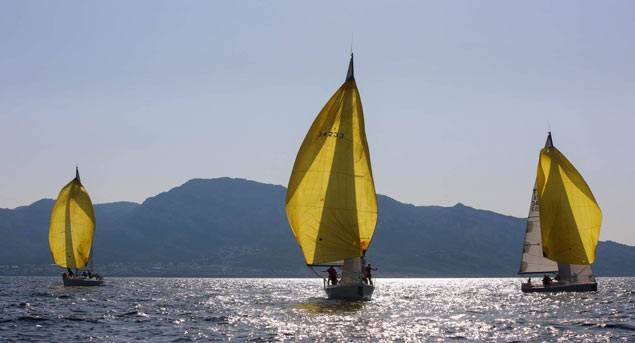 The Dublin team was disappointed that the last day of racing had to be cancelled due to lack of wind
The Dublin team was disappointed that the last day of racing had to be cancelled due to lack of wind
With a number of top three finished throughout the week, Team Ireland certainly were in contention for a podium finish, but unfortunately it was not to be.
The young team, skippered by Jack Higgins, will be setting their sights for the Irish Student Yachting Nations in April to qualify again for next year.
At the end of the second day of racing at the Student Yachting World Cup in Marseille, Ireland's UCD Sailing Club has moved up to fourth place overall.
As Afloat.ie previously reported, the UCD team is skippered by Jack Higgins, the teams consists of Patrick Cahill, Conor Foley, Nicole Hemeryck, Lucy McCutcheon, Luke Murphy and Conor Kneafsey. Following a history of SYWOC podium finishes in the last ten years, the young UCD team is hopin to bring home another medal for Ireland this weekend.
University of Strathclyde lead from Durham University. Japanese University entry Kobe are third, four points ahead of Ireland.
Download results after day two below.
UCD Sailing Team Lying Fifth at Student Yacht World Cup in France
After a lively opening ceremony held on Tuesday night, the UCD Team Ireland had an exciting first day of racing today at the Student Yachting World Cup in France.
Enjoying moderate winds, the Race Officer managed to run five races today, including four inshore races and a coastal race.
The Irish representatives secured three third places, a fourth and a fifth. They lie in fifth place overall, with only five points between the first five boats.
With another four days of racing lying ahead, everything is still to play for.
UCD Sailing Team Compete at Student Yachting World Cup
UCD Sailing Team set off yesterday to compete in the Student Yachting World Cup, held near Marseille, France. Having qualified against stiff competition at the Student Yachting Nationals in April, the team will represent Ireland in the week to come. The five day event will consist of both inshore races, coastal races and a night race, all in Grand Suprise keelboats.
Skippered by Jack Higgins, the teams consists of Patrick Cahill, Conor Foley, Nicole Hemeryck, Lucy McCutcheon, Luke Murphy and Conor Kneafsey. Following an illustrious history of SYWOC podium finishes in the last ten years, the young UCD team hopes to bring home another medal for Ireland.
It has been a busy few weeks for UCD, with the SYWOC event and the first team racing event of the season (run by UCD in Wexford) falling in the same week.
Ireland Will Be Represented by UCD in Student Sailing Worlds
University College Dublin, led by Will Byrne, won through in an increasingly challenging national selection trials at Howth YC yesterday to take the honour of representing Ireland in the 37th Annual Student Yachting Worlds, which this year will be staged in the Mediterranean in the Autumn at Marseilles, and raced in J/80s.
Howth’s ready-to-go flotilla of club-owned J/80s thereby provided double value, and they provided much whoop-inducing sailing as the south’easterly built steadily during the day. This deteriorating weather was to mean that the usual club Saturday afternoon racing at both Howth and Dun Laoghaire was cancelled. But by that stage, thanks to a tight programme set in train by Race Officer Scorie Walls with the briefing in HYC at 0830 and the first gun at 1000hrs, the Intervarsity programme was already well on its way.
Although today (Sunday) had been pencilled in as a fallback day, the mood of the fleet was very strongly in favour of having it all done and dusted by the time the forecast even stronger winds were expected to arrive late on Saturday afternoon, and Scorie and her team were able to oblige.
By using Howth’s clear water race area between the protecting island of Ireland’s Eye and Portmarnock, the racing could continue as the wind shunted upwards towards the 27 knots-plus level, prompting the Race Team to quip that if Ireland’s Eye didn’t exist, then they’d have had to invent it.
Nevertheless even this shelter could only do so much in the very dense and increasingly fast moving air, and with some damage being sustained, the final had to be based on two races sailed between Cork IT Sailing, Trinity CD Sailing, NUI Galway, and UCD.
UCD were on a roll as they’d notched three wins and a second in the four qualifying races, and they maintained this pace into the two final contests, with Trinity as runners-up and NUI Galway placing third overall. Now Marseilles calls, and UCD have an entire summer for further training in J/80s racing. But meanwhile, extraneous matters like exams have to be dealt with....
The Annual Student Yachting Worlds, sailed in performance keelboats each Autumn in France, has seen Irish overall success in times past, a noted international varsity star being Nicholas “Nin” O’Leary during his college days in Cork writes WM Nixon
But as it is raced in keelboats – in November 2016 at La Rochelle they sailed the Grand Surprise 31 – the selection trials in Ireland are staged as a separate event from the Irish Intervarsity Nationals, which are raced in dinghies (usually Fireflies), with 2017’s already staged in mid-March in Clifden in Connemara, and Trinity College Dublin, captain by Richard Roberts from Cork, winning overall.
However, with keelboat skills required for the Student Yachting Worlds, their 2017 selection will emerge from a series to be sailed this weekend in the Howth YC’s Club Flotilla of J/80s.
The format of the SYW is based on each nation being represented by its top-performing college, rather than by a national squad selected from the best-of-the-best in each crew, so the Selection Trials are one hotly contested inter-varsity event.
Last year in France at La Rochelle, there was unprecedented Trantlantic domination, with the Canadian team winning overall from the USA’s California Maritime Academy by one point. Southampton University (England) was best of the Europeans, with Ireland represented by Cork Institute of Technology taking fourth after a series in which at one stage they’d been very well in the frame.
Cork Institute of Technology take this World Series very seriously indeed, so they’ve two teams entered for this weekend’s selectors, CIT 1 captained by Jay Stacy, and CIT 2 headed by Ewan O’Keeffe. The “local varsity”, Dublin City University from just up the road, is also in the mix, skippered by Colm Roche.
The eight contenders are completed by University of Limerick (captain Chris McDaid), Queens University Belfast (Jocelyn Hill), University College Dublin 1 (William Byrne), NUI Galway (Sean Mahon) and Trinity College Dublin 1 (Rory McStay)
CIT Finish Fourth At Student Yachting World Cup, France
Cork Institute of Technology have finished fourth overall at the Student Yachting World Cup in France. It is disappointing result for Team Ireland after being in the top three overall all week.
Yesterday was very shifty on the water with breeze flicking from left to right for the two races, making conditions challenging for the crew.
There was consolation for CIT though who come away with a trophy for winning the night race.
Cork Institute of Technology Lying Third At Student Yachting World Cup
Tiredness slowly settled in after the demanding first few days of competition at the Student Yachting world Cup in France. The night race of the second day added even more strain to the crews, who quickly realized that perseverance would be as needed as raw skills to win the races from now on.
Three open sea races and one coastal race were run on this third day, just a stone’s throw away from the renowned Fort Boyard. The last one allowed competitors to win points for the special Trophy of our sponsor AGPM. Despite a tight competition, the USA Team won every race one after another and took the lead on the provisional ranking.
Unfortunately, the Japanese Team had to forfeit in the middle of the day due to an accident. The crew member was quickly taken to the closest hospital and got out in the next morning.
The day ended up with a Karaoke where the Loughborough Team made a remarkable performance of “Let it go”. After three days of racing, the overall results are as follows : first comes the California Maritime Academy (USA-20 points) followed by Southampton University (UK-23 points), Cork Institute of Technology (Ireland) and Queen’s University (Canada) at 26 points, EPFL (Switzerland-35points), Loughborough (UK-36 points), Strathclyde University (Scotland-54 points) and Kobe University (Japan-67 points).
UCD Students Place Third In 2015 Student Yachting World Cup
#SYWoC - The team from University College Dublin have place third in this year's Student Yachting World Cup.
Ryan Glynn (skipper), Ronan Jones, Colin O’Mahoney, Cliodhna Conolly, Cian Cahill and Emma Reidy beat such noble institutions as Cambridge and Oxford to the bronze position, behind the University of Southampton and SYWoC winners from the Ecole Polytechnique Federale de Lausanne in Switzerland.
As previously reported on Afloat.ie, it was UCD's fourth participation in the week-long racing event, where they previously lifted the cup in 2012.
Sailors from Trinity College Dublin – also previous cup winners, in 2006 – were also competing but failed to make the top 10.



























